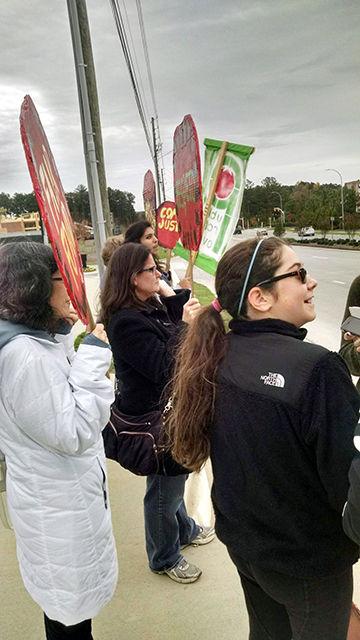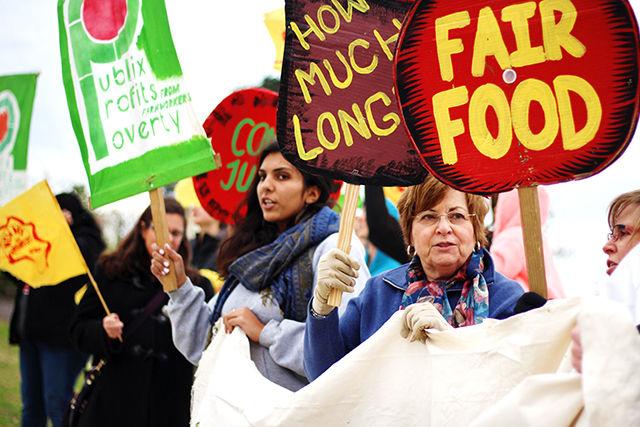This past Sunday, protesters gathered in the chilly gray afternoon with signs displaying bright red tomatoes in front of the Publix supermarket in Cary, inspired by the purpose of their cause. Organized by the Coalition of the Immokalee Workers from Florida, the protest known as the Publix Truth Tour has made appearances in cities across North Carolina including: Asheville, Durham, Raleigh, Chapel Hill and Charlotte.
The Coalition of Immokalee Workers (CIW) is a worker-based and worker-run human rights organization founded in 1993 by workers in the tomato industry of Florida. Their Publix Truth Tour strives to give Florida farmworkers the opportunity to spread awareness of the poverty and exploitation behind the food we eat. It also encourages Publix to join CIW’s program, the Fair Food Program.
According to Lupe Gonzalo, a farmworker that has followed the tomato harvest on the east coast for 12 years and a three-year member of the CIW, in order for a corporation to be Fair Food Program certified, there are three CIW demands it must comply with.
These demands include: pay an extra penny per pound for every pound of tomatoes that they buy from growers, purchase only from farms that implement this code of conduct on their farms—which calls for zero tolerance for sexual harassment and modern-day slavery—and allow the workers to have a voice in their workplace.
“We know that farmworkers have traditionally faced many different types of abuses in the fields on behalf of their supervisors or the owners of the fields,” Gonzalo said. “For example, there’s been cases of wage theft, sexual harassment for women, physical and verbal abuse and also, in extreme cases, modern-day slavery.”
The Coalition of Immokalee Workers’ Fair Food Program was founded in 2011 and provides an alliance with retailers to support worker-driven social responsibility. According the CIW website, since the start of the program it has contributed $15 million to Florida tomato farms’ payrolls. Some of their supporters include Walmart, McDonalds, Burger King and Taco Bell.
“What this means for workers is that for the first time they are receiving education on what their rights are under the program,” Gonzalo said. “They’re able to get better pay through the penny-per-pound premium. They also have a mechanism through which to file complaints – not just file them, but see them through to resolution – and make sure that the exploitation that they were facing in the past is no longer happening. We want to make sure that the workers have the necessary protections that they didn’t have before.”
Through awareness protests, and seeking the support of consumers and corporations, the CIW strives to incentivize growers to join the Fair Food Program. Thus far, 14 companies and 32 growers have been Fair Food Program Certified. It is a chain reaction – if consumers want to buy fair food, then corporations will have to source it, and if corporations want fair food, then growers will have to supply it.
Protester, Ann Rothe, a retired university library technician from NC State University said this was her first time joining a protest. Rothe said she has history with farm work, so she felt like she needed to support the coalition.
“I feel there’s strength in numbers and the publicity that is received after these kinds of events – it just builds little by little,” Rothe said. “I’m one little drop in the bucket, but they all add up. I identify to a certain extent, I’ve worked with tobacco, so my heart is in it too.”
In response to the protest, Kim Reynolds, the Charlotte division manager of media and community relations for Publix, gave the corporation’s view of the situation.
“What’s happening here today is that we truly believe that this is a labor dispute,” Reynolds said.
“The Coalition of Immokalee workers is asking Publix to pay a penny more per pound for tomatoes that are picked, and we are more than willing to pay that extra penny per pound provided that it’s put into the price that we pay for tomatoes. So, if our suppliers charge us that amount, whatever that market value is, we will definitely pay it. It’s not appropriate for us to pay workers who are not our own employees or associates.”
Despite the response from Publix on Sunday, the CIW will continue to work toward higher wages and improved rights for farmworkers.
“Many times, consumers don’t know what is behind the products that they consume every day, so they don’t know that there is a strong connection between us workers and the consumer,” Gonzalo said. “If you eat every day, then there is a person working hard to harvest that produce.”
The Coalition of Immokalee Workers visited North Carolina through their Publix Truth Tour, advocating for its Fair Food Program.









